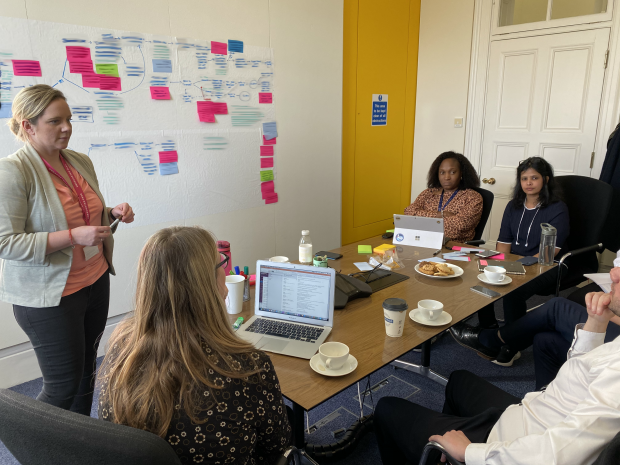An example of GDS Standards Assurance & UKEF Digital team collaboration
At GDS, we’ve written about how the standards assurance team helps government departments deliver better services and technology, including working with capability leads to do so. We have previously said that we saved the government an estimated third of a billion pounds in 2019/20. There are different ways of measuring and delivering value not always captured in such publications. In this blog we’ll show how we’ve achieved this with UK Export Finance (UKEF).
UKEF is a small, yet important, government department, helping exporters win contracts, fulfill orders, and get paid. Its mission is “To ensure that no viable UK export fails for lack of finance or insurance, while operating at no net cost to the taxpayer.”
UKEF is on an exciting transformation journey, and we want to share insights learned. They’ve done great work so far but their journey has not been straightforward.
Understanding the background
Our journey with UKEF began at a time when GDS was seen as a disruptor across government. In mid-2018, thanks to efforts from both UKEF and GDS, we re-engaged with the UKEF digital team to understand what problems existed and how we could move forward.
Understanding the history behind a digital service’s evolution is important and at GDS we need to understand the reasons that informed those decisions. Meeting stakeholders and rebuilding the relationship with UKEF was key to get us where we are today. Once we reached a shared understanding about how to bring the service in line with GDS standards, we were able to identify what kind of support we’d need to provide.
Checking if the service meets the government service standard
GDS set up a workshop to review UKEF’s service against the service standard. Getting a deeper look at the service was critical. This gave the UKEF digital team evidence to ask senior leaders for more investment and resources to develop and govern the service in line with the government service standards.
Bringing in the support, guidance and expertise from GDS has helped validate our thinking and provide evidence for change
- Arwen Robertson - UKEF Head of Operations
GDS and UKEF worked together to understand the technology that underpinned the service and how it aligned to the technology codes of practice. This also provided GDS with an informed view of the technical architecture across the UKEF service landscape. Understanding what can be reused or absorbed allows departments to make strategic technology decisions. We both wanted to make sure we understood the opportunities that currently existed inside UKEF before looking elsewhere for potential solutions.

Dealing with change
We focused on governance, programme management and accountability next. Collectively, we had to be confident the right governance was in place to scrutinise and oversee important decisions the service was making.
Historically, UKEF were using Waterfall and traditional IT methodologies, which are very different from Agile and user-centred design principles. When new service team members started at UKEF, things began to change. There was a willingness to challenge the culture and ways of working to allow for more collaborative and iterative methods focusing on:
- continuous learning
- prioritising user needs
- learning from best practices to achieve the best outcomes
With technical and strategic support from GDS, regular project assurance meetings were set up as part of an ongoing review process. And UKEF connected with other government departments and cross-community Digital, Data and Technology networks to take part in discussions about best practice and techniques.
Working through the ‘as is’
Breaking down GDS feedback into something tangible that your organisation can use to improve a service can be a daunting task. UKEF broke down the workshop feedback into a 52-point plan grouped by the following themes:
- people
- strategy
- design
- technology
- data
Whilst this was a good start, prioritising where to start was still challenging.
Although UKEF had pockets of digital talent, it was clear they did not have sufficient capabilities to deliver the recommendations - there was no multidisciplinary team to focus on the service.
Through a series of meetings; workshops; and reviews of the business case, action plan and service standard feedback, GDS and UKEF identified what kind of capabilities could complement existing resources to deliver the plan.
Getting approval for a short discovery phase
GDS and UKEF worked together to advise key stakeholders that a short discovery was needed. It would focus on producing a service action plan including:
- a validated library of user stories
- a detailed cost model
- a product backlog
- an independent review of the current service with the service standards recommendations
- an initial plan and service delivery approach
- a recommended team
UKEF brought in an external team of digital experts via the Digital Outcomes and Specialist framework, to carry out this work.
Reevaluating the current direction
At the beginning of the discovery, the team analysed the outputs and offered recommendations from the initial beta workshop. They used this as a basis to build on the 52-point plan.
The team reviewed current UKEF strategy and priorities, and potential challenges they faced; the discovery highlighted the need for a different approach, and ultimately supported the reworking of the business case with us, giving UKEF a way to rethink what was possible.
This enabled the team to produce an evidence-based business case that clearly articulated the need to develop a multidisciplinary service team and transform the service.

Embarking on a new approach
Changing course is not without its own challenges. To achieve change, a team needs to be empowered to make transformational decisions.
The service team made their case to the UKEF board, taking care to address the concerns of internal stakeholders.
It was clear from the beginning that building the right team was the most important thing to do. UKEF needed to build an internal team that would be receptive to and contribute directly and efficiently to their transformation agenda.
The next step was to reflect the team-building needed in the business case and support the UKEF team at board level meetings. This would help them make a robust case for investing in capability as opposed to buying this externally. It was important to demonstrate to the UKEF board that GDS fully supported the approach, lending the team credibility in front of the board.
Having GDS engaged made the spend controls process easier and efficient as they were very much a part of the discovery journey with us.
We’re not there yet
Building a service team came next. The core team comprised of civil servants and, with the support of GDS, went through 2 rounds of procurement to stand up a team with the full complement of capabilities, buying in Service Design and Development resources. It’s a bit of a catch-22 when buying in resources: how do you judge the capabilities of a job that you don’t do yourself? This is where the UKEF team leveraged GDS, having a Consulting Technical Architect and Senior Developer join them to provide insight, technical scoring techniques and advice. This left no stone unturned: skills, business acumen and cultural fit were all assessed.
Now, with a service team in place, UKEF begins the phase to fully transform their service and build the stable foundation for a sustainable and agile service ready to enable the long term vision of UK Export Finance.
Lessons learned
The process was not rushed, nor forced, but executed at the right pace - one the service team were comfortable with - to show the investment in their discovery and drive, and to improve their service for all involved. The work not only sets the stage for their service transformation, but is an example of a brilliant way to approach legacy technology transformation via discoveries and charting a course forward directly with the relevant users. This has been a valuable learning process and something that GDS would like to see replicated across government.
This allowed GDS to see how we can better influence decisions made, and reflect on how we support service teams, by standing with them, offering our advice in a progressive manner, and visibly supporting the departmental responsible senior leaders.
Working collaboratively with GDS gave UKEF the reassurance that challenging and changing our approach was the right thing to do. Pausing, rethinking and realigning is daunting, but sometimes necessary.
- Dan Bowden - UKEF Head of Digital Operations
Contact gdsapprovals@digital.cabinet-office.gov.uk for any queries related to this blog.



2 comments
Comment by Zebedee Gee posted on
Please note the Gov.uk style guide and the need for simple English
Comment by The Service Design & Assurance Team posted on
Hi Zebedee,
We agree; as part of developing modern, accessible services the GOV.UK style guide provides consistency; and by using clear, simple language, content that is easily digested.
Thanks,
The Service Design & Assurance Team